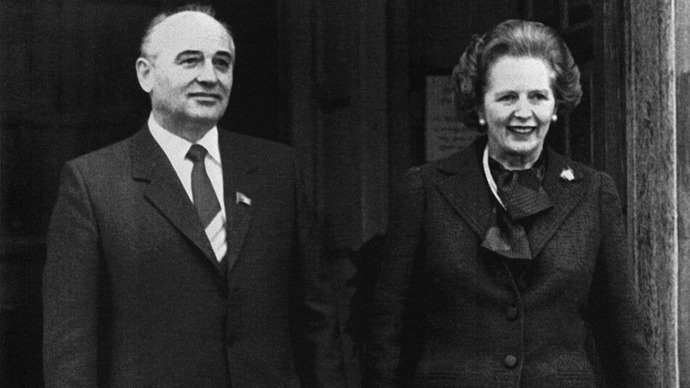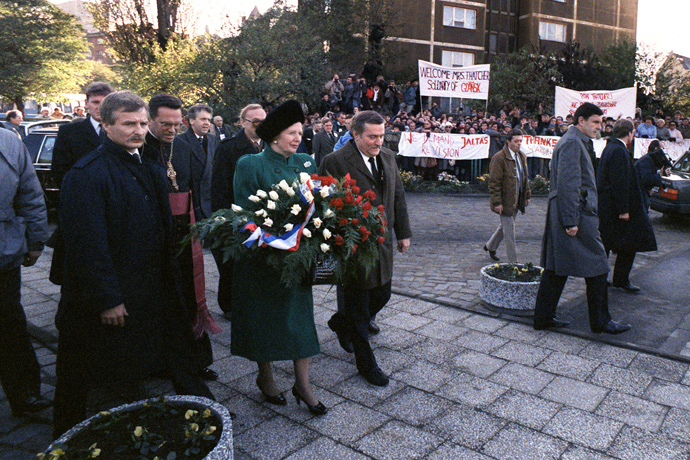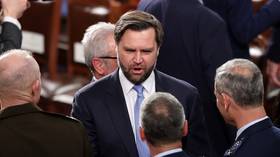Thatcher and the Soviet Union: The Iron Lady who helped bring down the ‘Evil Empire’

It was a Soviet journalist who coined the moniker the Iron Lady for Margaret Thatcher. Intended as an insult, by the time she left office, for Russians it became a term of affection, or at the very least, grudging respect.
The speech that earned her the nickname (for which she later personally thanked the Soviet press) marked her out as a staunch, if not particularly perceptive, opponent of the Soviet Union. The recently-chosen leader of the opposition Conservative party told a packed town hall in early 1976, that the USSR was a “dictatorship of patient, far-sighted determined men…bent on world dominance…and acquiring the means to become the most powerful imperial nation the world has seen.” She may have over-estimated the offensive capabilities of a country that would soon become ruinously bogged down in an indecisive Afghanistan conflict for a decade, but one thing was clear – Thatcher would not appease Moscow.
Upon assuming power in 1979, she was as good as her word. As the
USSR looked to supplement its conventional military superiority in
Europe with SS-20 intermediate nuclear weapons, NATO needed to find
a European country that would house the nuclear GLCMs that would
form a proportionate response. Despite months-long protests by
thousands of CND activists at the UK's Greenham Common base, it
became the first location in Europe to host the NATO
rockets.
The deployment in 1983, together with Reagan’s Strategic Defense Initiative (commonly referred to as “Star Wars”) forced the USSR to engage in an arms race its creaking economy could not sustain. Eventually, the Soviet leadership became convinced it was a battle it could not win, and signed the Intermediate-Range Nuclear Forces Treaty in 1987.

But, somewhat ironically, her biggest success was not in resisting the Soviets, but talking to them. Being a staunch critic of the Kremlin, when she did find a man with whom she “could do business together”, Mikhail Gorbachev, her conciliatory gestures carried weight. She was the first to sense that Gorbachev, who visited her residence in 1984 before he even officially became the new Soviet leader, represented a fresh vector in Soviet foreign policy, and the first man with whom a genuine two-way conversation could be had. Her positive introduction of a man she said she “liked” made headlines around the world, and set the tone for the rapprochement between Russia and the West as the Warsaw Pact was crumbling in Eastern Europe (Gorbachev himself has said that the introduction was “helpful”). It is unlikely that Gorbachev would have sent in tanks into East Germany in 1989 as the Berlin Wall was about to be torn down anyway, but five years of solid diplomacy between the US, the USSR and the UK, made the prospect particularly unappealing, and meant any invasion could not be rationalized by Soviet hardliners as a defensive measure against a rampaging NATO.
Meanwhile, all through the years on the international diplomatic carousel, Thatcher was not once seen abandoning her politics (she told Gorbachev “I hate Communism” even as she welcomed him into her residence during that first meeting). This gave her a subversive power throughout Eastern Europe that she managed to use to great effect – charismatically chiding Communist leaders from an ever taller pulpit, even as she masterfully negotiated with them. Her diplomatic high point was perhaps in 1988, when on a visit to Poland, straight after talks with leader General Wojciech Jaruzelski, she travelled down to the shipyards in Gdansk, and spoke warmly with Lech Walesa, the leader of the protest Solidarity movement in front of a cheering crowd of thousands.

Notably, however, when the collapse of East Germany neared
Thatcher plainly told Gorbachev “We do not want a united
Germany,” citing “a degree of fear” of a country
“that started two world wars.” In this she perhaps revealed
her true colors as a British nationalist first, and an
international anti-Communist second. All the same, her influence in
Eastern Europe, together with other iconic figures, such as John
Paul II, gave international legitimacy to protest. And without its
satellites collapsing, Kremlin would likely not have
budged.
A portrayal of Thatcher as the mastermind of the downfall of the
USSR has become almost orthodoxy among Soviet nostalgics, but it
would be fair to say that Thatcher did not play the decisive role.
The Soviet Union’s economic stupor, Eastern Europe’s satiation with
socialism, and America’s mounting military and diplomatic
superiority were more influential underlying causes. And any Prime
Minister or President sitting opposite a Soviet leader reforming,
and in the process dismantling, the world’s biggest empire, would
have had a place in history.
But Thatcher (besides Reagan) did not simply watch the USSR implode. The Prime Minister became both a symbol for implacable Western European values for those who opposed the system, and for those in the Kremlin, a diplomatic bridge to the former arch-enemies in Washington. The stick and carrot policy, masterfully executed by the allies in the "special relationship", made an arms race with the West futile, and reconciliation an attractive prospect. While the domino fall of Communist states looked inevitable once it began, the trigger push could have taken much longer if not for the forceful nudging from Thatcher and her partners in the White House.
And while many in modern Russia still lament the collapse of the Soviet Union, few would disagree with Mikhail Gorbachev’s description of Thatcher upon her death:
“Her experience as a state leader and her thoughts about the prospects of our changing world had to be appreciated whether one agreed with them or not… Margaret Thatcher was a great politician and an exceptional person. She will remain in our memories and in history.”
Igor Ogorodnev, RT
The statements, views and opinions expressed in this column are solely those of the author and do not necessarily represent those of RT.












